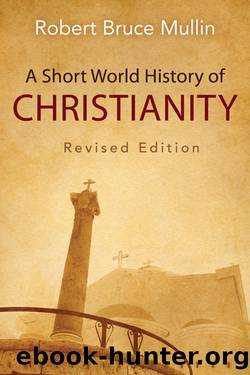A Short World History of Christianity by Robert Bruce Mullin

Author:Robert Bruce Mullin
Language: eng
Format: epub
ISBN: 9781611645514
Publisher: Westminister John Knox Press
Published: 2014-08-15T00:00:00+00:00
Pietism had a revolutionary impact on continental Protestantism. Worldly amusements that had long been tolerated, particularly the use of alcohol, began to be questioned. The active responsibility of all Christians in good works and the stewardship of wealth were stressed. Finally the responsibility for mission entered into Protestant consciousness. As we have seen, for over a century and a half after the Reformation Protestants were pointedly absent from missionary outreach. With Pietism the missionary impulse blossomed.
One of the groups influenced by Pietism was the Moravians. Their religious dedication made them willing to go anywhere to serve Christ, and they became famous for their missionary labors. But ironically it was through their decision to start a community in the American colonies in the early 1730s that they became most famous in the later history of Christianity. In Georgia, they made a strong impression on a young Anglican cleric, John Wesley. Moravians became the conduit between continental Pietism and English Methodism.
Wesley and the People Called Methodists
John Wesley (1703â1791) is arguably the most important eighteenth-century religious figure in the English-speaking world. Born into a clerical family, he and his brother Charles followed their fatherâs profession. While at Oxford, John, always disciplined in his religious devotion, gathered a small group of like-minded souls who fasted, prayed, and did works of mercy so methodically that they were derisively called âMethodists.â In 1735 the Wesley brothers traveled to the colony of Georgia, an eighteenth-century experiment in philanthropy where debtors were given a second chance. A Moravian leader there, August Spangenberg, asked John the pointed question âDo you know Jesus Christ?â Wesley could only respond, âI know he is the Saviour of the world.â But when the Moravian pressed him, âTrue, but do you know he has saved you?â Wesley could not honestly answer yes.
Spangenbergâs question centered on personal certainty. Did Wesley possess not only the churchâs faith but a true and lively personal faith? The question would dog him. His ministry in Georgia turned out to be a failure, not only because of an unfortunate love affair but because it raised questions as to whether true religion could be achieved by rigorous religious practice alone. Two years after returning to England, on May 24, 1738, in a chapel on Aldersgate Street in London, Wesley achieved this certainty. Writing in his diary, he stated that his âheart was strangely warmedâ and that he had experienced that personal saving faith he had felt he had lacked. He traveled to the Moravian community in Germany, and there he vowed to promote âvital practical religionâ and to increase the life of God in the souls of men. Although influenced by the Moravians, Wesley differed from them in his emphasis on activity in the world. Wesley himself lived up to his call for action. Over the course of his long life he is said to have traveled 225,000 miles on horseback and given 40,000 sermons!
For Wesley, without a transformed heart a person was at best only an external Christian. Without it one could not truly know spiritual things.
Download
This site does not store any files on its server. We only index and link to content provided by other sites. Please contact the content providers to delete copyright contents if any and email us, we'll remove relevant links or contents immediately.
The Secret Power of Speaking God's Word by Joyce Meyer(3152)
Signature in the Cell: DNA and the Evidence for Intelligent Design by Stephen C. Meyer(3121)
Real Sex by Lauren F. Winner(3001)
The Holy Spirit by Billy Graham(2937)
The Gnostic Gospels by Pagels Elaine(2515)
Jesus by Paul Johnson(2347)
Devil, The by Almond Philip C(2322)
23:27 by H. L. Roberts(2241)
The Nativity by Geza Vermes(2220)
Chosen by God by R. C. Sproul(2152)
All Things New by John Eldredge(2149)
Angels of God: The Bible, the Church and the Heavenly Hosts by Mike Aquilina(1948)
The Return of the Gods by Erich von Daniken(1925)
Angels by Billy Graham(1915)
Knowing God by J.I. Packer(1844)
Jesus of Nazareth by Joseph Ratzinger(1797)
The Gnostic Gospel of St. Thomas by Tau Malachi(1779)
How To Be Born Again by Billy Graham(1775)
Evidence of the Afterlife by Jeffrey Long(1773)
